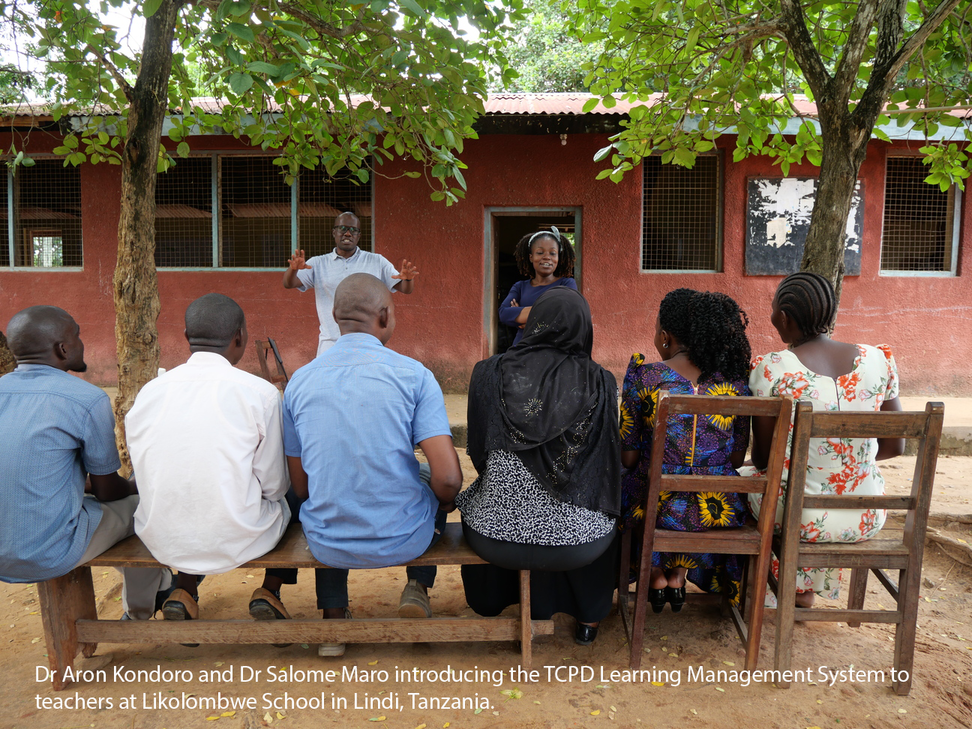About
EdTech Hub works in close partnership with the Government of Tanzania to strengthen the national education system through the effective use of technology. We focus on helping government partners design and improve policies and programmes by generating and using evidence, working in partnership with the Ministry of Education, Science, and Technology (MoEST), the Prime Minister’s Office – Regional Administration and Local Government (PMO-RALG), and the Tanzania Institute of Education (TIE). Through cycles of implementation research, we unpack the opportunities and challenges afforded by the national tech-enhanced teacher continuous professional development (TCPD) programme, and deliver agile technical assistance to strengthen equity, inclusion, and usability. Using our integrated approach, EdTech Hub also provides embedded technical assistance and research on critical topics such as data for decision-making and climate resilience in education.
Bridging the Gap
The challenge
As Tanzania continues to expand access to education and implement key reforms, several ongoing challenges remain. To keep up with curriculum and policy changes, teachers need to access practical and relevant professional development at scale. Decision-makers require timely and accurate data to guide planning and resource allocation to improve outcomes. In addition, the education system must adapt to the increasing impact of climate change on infrastructure and learning. EdTech can help address these challenges by providing scalable tools and approaches that strengthen teaching, support data use, and build resilience.
How EdTech Hub Helps
We work hand-in-hand with government institutions to co-design, test, and scale technology-enabled solutions grounded in evidence. Our team provides embedded technical assistance, leads practical research, and convenes stakeholders to build capacity and align efforts across the education sector. Our work in Tanzania is long-term, adaptive, and centred on strengthening national education systems.
Key themes
- Climate Emergencies
- Data for Decisions
- Teacher Continuous Professional Development
Latest Insights from Our Work
Timeline of Activities
April 2021
- Leading design-based implementation research (DBIR) with the Tanzania Institute of Education and Aga Khan University to test implementation and improve access, equity, and feedback mechanisms in TCPD delivery.
- Supported the government in developing the national school-based TCPD implementation plan. This unlocked over GBP 50 million of World Bank funding.
2021–2022
Supported the Revolutionary Government of Zanzibar with the conceptualisation and initial user research for a teacher-centred Virtual Learning Environment and associated Theory of Change endorsed by education stakeholders.
2021–Present
Leading design-based implementation research (DBIR) with the Tanzania Institute of Education and Aga Khan University to test implementation and improve access, equity, and feedback mechanisms in TCPD delivery.
Technology-Supported Teacher Professional Development in Tanzania
A study exploring the design, equitable access and efficacy of a school-based teacher professional development model implemented at scale.

Reports, Blogs, Case Studies and More
Building Foundational Learning through Technology in Sierra Leone — Evaluating the Efficacy and Cost-effectiveness of Two EdTech Models
This study evaluated the effectiveness and cost-effectiveness of three implementation modalities for One Billion’s onecourse: standard (one-tablet-per-learner), tablet-sharing (one tablet shared by two learners), and projector (whole class). This intervention…
Getting Teachers Where They’re Needed Most: Insights from Sierra Leone’s GIS-Supported Preference Matching Algorithm
This summary discusses the conversation from a virtual meeting that covers lessons and what worked with the Sierra Leone GIS preference matching algorithm and lessons from other regions including South…
Transforming Teacher Deployment: Lessons from a matching algorithm tool
Sierra Leone, like many low- and middle-income countries (LMICs), faces persistent challenges in deploying qualified teachers across its schools equitably. In 2024, the Teaching Service Commission (TSC), with support…
Shifting Power Dynamics in Education Decision-Making: Investigating the role of a matching algorithm to improve teacher deployment in Sierra Leone
This report is part of the multi-year EdTech-Hub-Led project (HLR 3) on the Impact of GIS-Supported Teacher Allocation in Sierra Leone where EdTech Hub and research partners Fab Inc…
Sierra Leone Digital Learning Landscape Analysis: Developing the National Digital Learning Strategy
In 2024, the World Bank submitted a request to EdTech Hub’s Helpdesk to support the Government of Sierra Leone in developing a National Digital Learning Strategy. The Hub initiated…
How Do In-Service Communities of Practice Support Teacher Learning and What Role Can EdTech Play?
This Learning Brief is part of the EdTech Hub Learning Brief Series, providing practical resources for people working to improve the use of technology in education. In this brief,…
Meet the Team
Technical Consultants
Evidence for Decision-Making
Explore our full publications library on Tanzania to support policy and practice.
Global Partners























